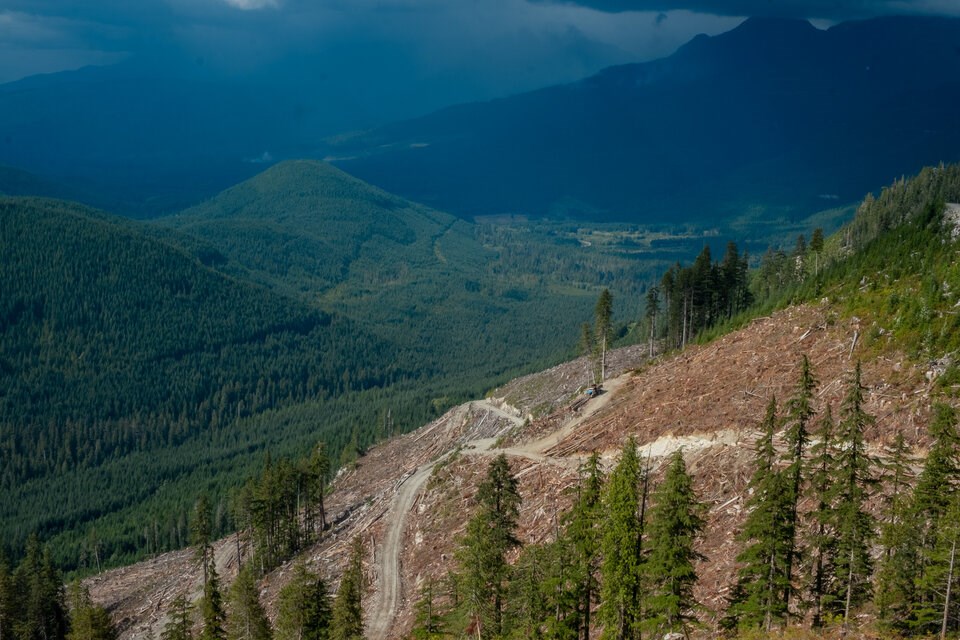A new report has handed the B.C. government failing and near-failing grades on its efforts to protect old-growth forests across the province.
The interim report card, published Thursday, is the fifth time the Wilderness Committee, Sierra Club BC and Stand.earth have reviewed how the government is living up to 14 recommendations made under the Old-Growth Strategic Review in 2020.
The NDP government had previously pledged to carry out those recommendations "in their totality" over a three-year time frame, notes the report. But in every area, the report card found the government is falling short with only six months to go.
"None of the 14 recommendations have been implemented at this point and time," said Jens Wieting, a senior forest and climate campaigner at Sierra Club BC.
Old-growth covering 3,600 Stanley Parks still at risk of logging, say environmental groups
Wieting says one of the government's most troubling failures has been its inability to fulfill the Old-Growth Strategic Review Panel's call for a six-month interim protection order for at-risk old-growth.
In the fall, the government claimed record-low old-growth logging. That didn't square with what the three environmental groups were seeing on the ground, said Wieting.
"What we learned pressing the government for a little bit more information is that the majority of the most at-risk old-growth forest is still open to logging — about 55 per cent of the 2.6 million hectares that's considered most at risk," he said.
That's equivalent to "about 3,600 Stanley Parks," as a spokesperson for Stand.earth put it.
A spokesperson for the Ministry of Forests said the province is "committed to deferring" the 2.6 million hectares of priority old-growth forest. Since the Old Growth Strategic Review was released, the ministry spokesperson said 0.23 per cent of old-growth forests the technical advisory panel identified as priority and at-risk have been harvested.
Province receives 'F' for lack of transparency
The report card gave the B.C. government an 'F' for its lack of transparency and communication, stating it has "repeatedly cherry-picked data to exaggerate limited progress to date."
Geoff Senichenko, the coordinator of research and mapping at the Wilderness Committee, said while the province has announced old-growth deferrals with First Nations, they haven't released any maps to back up what they are saying.
"It's very vague," said Senichenko.
The report also gave the province a failing grade on its failure to hit certain milestones in its three-year plan.
Instead of "committing to milestone dates, [the government] described all recommendations as 'ongoing' work — a clear recipe for 'talk-and-log,'" the report card stated.
Province handed three near-failing grades
In 2020, the Old-Growth Strategic Review Committee recommended a "paradigm shift" from a forestry model centred on extraction to one focused on conserving biodiversity.
A spokesperson from the Ministry of Forests said the province has accelerated that plan, pointing to a $25-million investment it made into new Forest Landscape Planning tables meant to bring roughly 50 First Nations together to improve the management of old-growth forests.
The spokesperson also listed carbon offset programs and its goal to finish an Old Growth Strategic Action Plan by the end of 2023.
The report card acknowledged Premier David Eby's recent steps to "accelerate action" over the long term but criticized the premier for lack of funding in this year's provincial budget.
Despite its long-term promises, the province's already approved logging plans "remained largely unchanged," claims the report card, earning the B.C. government a 'D' in its efforts to prioritize ecosystem integrity.
A 'D' grade was also handed to the government for not providing enough funding to First Nations to transition to more sustainable harvesting practices.
In a written statement to Glacier Media, forestry minister Bruce Ralston said the province is committed to addressing all of the recommendations of the Old Growth Strategic Review.




